The Intel 9th Gen Review: Core i9-9900K, Core i7-9700K and Core i5-9600K Tested
by Ian Cutress on October 19, 2018 9:00 AM EST- Posted in
- CPUs
- Intel
- Coffee Lake
- 14++
- Core 9th Gen
- Core-S
- i9-9900K
- i7-9700K
- i5-9600K
CPU Performance: Office Tests
The Office test suite is designed to focus around more industry standard tests that focus on office workflows, system meetings, some synthetics, but we also bundle compiler performance in with this section. For users that have to evaluate hardware in general, these are usually the benchmarks that most consider.
All of our benchmark results can also be found in our benchmark engine, Bench.
PCMark 10: Industry Standard System Profiler
Futuremark, now known as UL, has developed benchmarks that have become industry standards for around two decades. The latest complete system test suite is PCMark 10, upgrading over PCMark 8 with updated tests and more OpenCL invested into use cases such as video streaming.
PCMark splits its scores into about 14 different areas, including application startup, web, spreadsheets, photo editing, rendering, video conferencing, and physics. We post all of these numbers in our benchmark database, Bench, however the key metric for the review is the overall score.
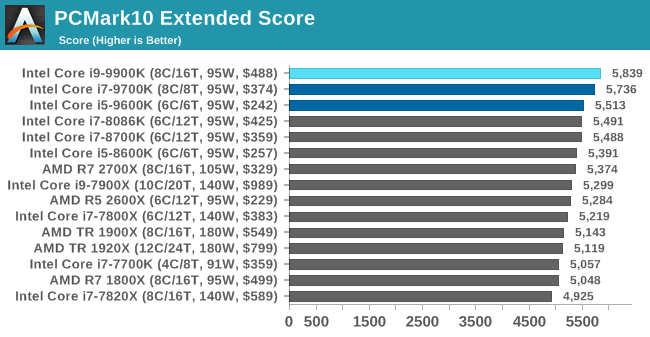
As a general mix of a lot of tests, the new processors from Intel take the top three spots, in order. Even the i5-9600K goes ahead of the i7-8086K.
Chromium Compile: Windows VC++ Compile of Chrome 56
A large number of AnandTech readers are software engineers, looking at how the hardware they use performs. While compiling a Linux kernel is ‘standard’ for the reviewers who often compile, our test is a little more varied – we are using the windows instructions to compile Chrome, specifically a Chrome 56 build from March 2017, as that was when we built the test. Google quite handily gives instructions on how to compile with Windows, along with a 400k file download for the repo.
In our test, using Google’s instructions, we use the MSVC compiler and ninja developer tools to manage the compile. As you may expect, the benchmark is variably threaded, with a mix of DRAM requirements that benefit from faster caches. Data procured in our test is the time taken for the compile, which we convert into compiles per day.
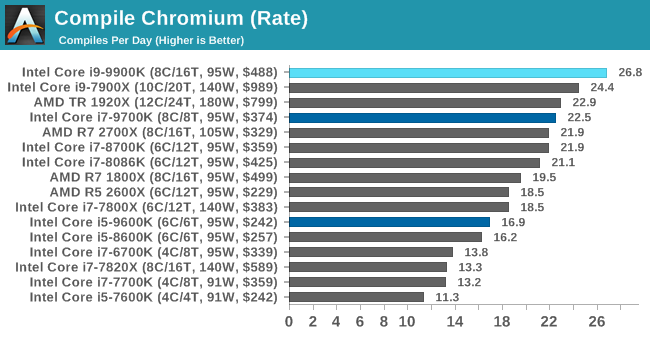
Pushing the raw frequency of the all-core turbo seems to work well in our compile test.
3DMark Physics: In-Game Physics Compute
Alongside PCMark is 3DMark, Futuremark’s (UL’s) gaming test suite. Each gaming tests consists of one or two GPU heavy scenes, along with a physics test that is indicative of when the test was written and the platform it is aimed at. The main overriding tests, in order of complexity, are Ice Storm, Cloud Gate, Sky Diver, Fire Strike, and Time Spy.
Some of the subtests offer variants, such as Ice Storm Unlimited, which is aimed at mobile platforms with an off-screen rendering, or Fire Strike Ultra which is aimed at high-end 4K systems with lots of the added features turned on. Time Spy also currently has an AVX-512 mode (which we may be using in the future).
For our tests, we report in Bench the results from every physics test, but for the sake of the review we keep it to the most demanding of each scene: Ice Storm Unlimited, Cloud Gate, Sky Diver, Fire Strike Ultra, and Time Spy.
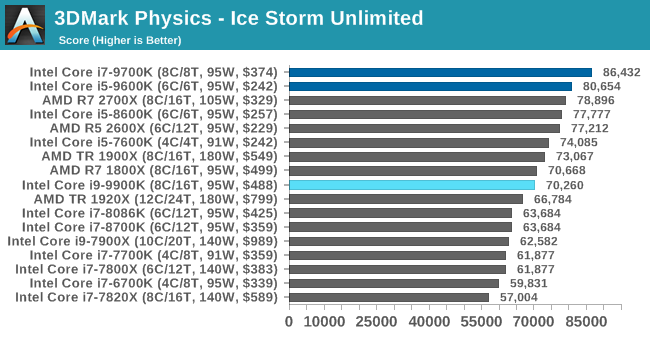
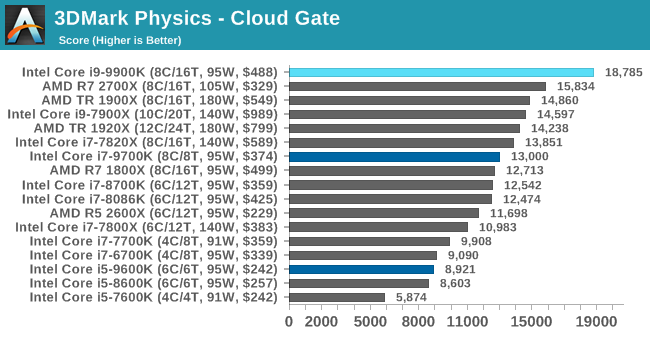
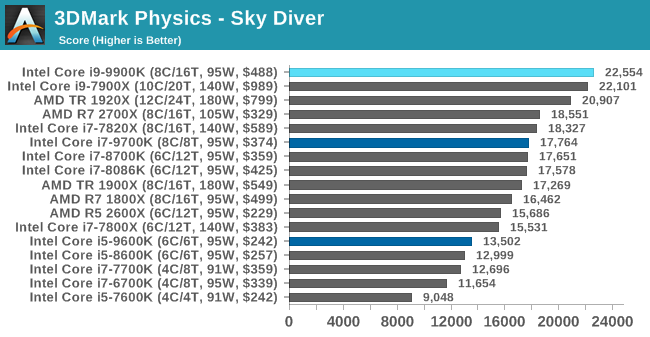
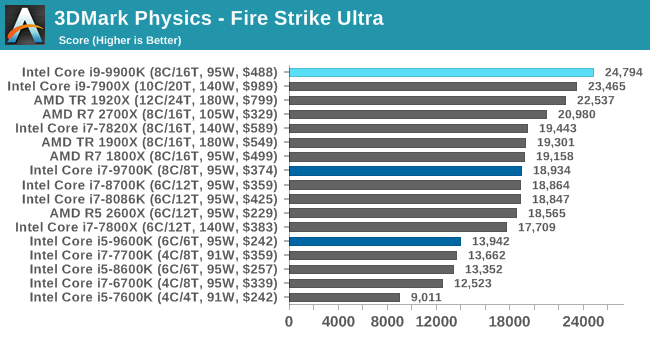
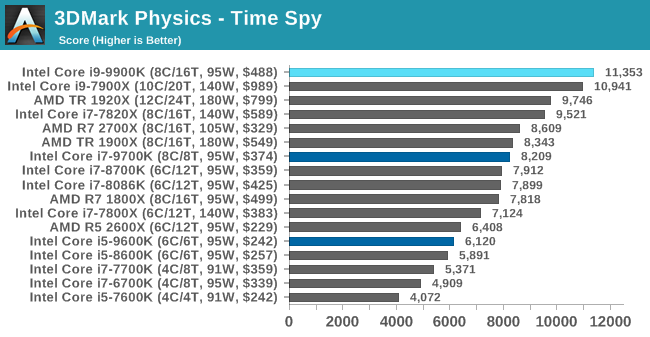
The older Ice Storm test didn't much like the Core i9-9900K, pushing it back behind the R7 1800X. For the more modern tests focused on PCs, the 9900K wins out. The lack of HT is hurting the other two parts.
GeekBench4: Synthetics
A common tool for cross-platform testing between mobile, PC, and Mac, GeekBench 4 is an ultimate exercise in synthetic testing across a range of algorithms looking for peak throughput. Tests include encryption, compression, fast Fourier transform, memory operations, n-body physics, matrix operations, histogram manipulation, and HTML parsing.
I’m including this test due to popular demand, although the results do come across as overly synthetic, and a lot of users often put a lot of weight behind the test due to the fact that it is compiled across different platforms (although with different compilers).
We record the main subtest scores (Crypto, Integer, Floating Point, Memory) in our benchmark database, but for the review we post the overall single and multi-threaded results.
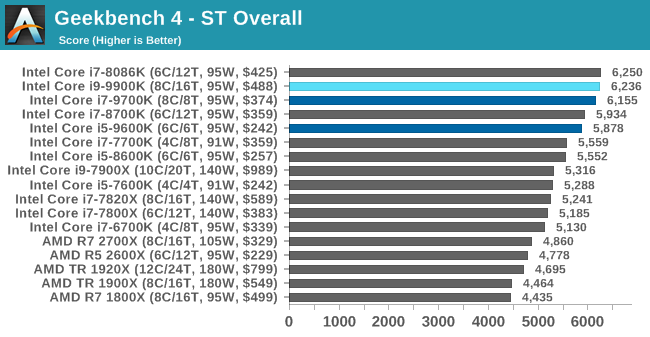
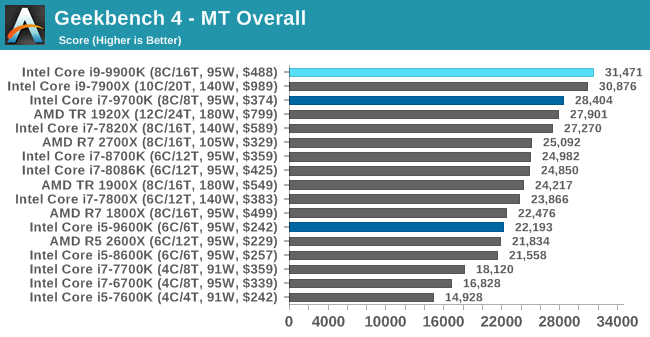










274 Comments
View All Comments
ChefJoe - Friday, October 19, 2018 - link
I have two wants.1 - I really want to see the overclocked 9600k vs overclocked 8600k, as the chart differences of it in this early draft of your 9900k-focused review are likely the wildly different clock speeds of the 86 and 96 parts.
2 - I still want to hear what happens when you drop one of these refresh parts in an older z370 board with an older bios. Do boards that were ok with 8600k refuse to boot a 9600k?
ChefJoe - Friday, October 19, 2018 - link
ack, 9700k-focused at this point. The 9900k overclock part of the review (and presumably 9600k eventually) is still pending.Ghan - Friday, October 19, 2018 - link
My plan was to upgrade from my current i7 6700k to the i7 9700k, and this article seems to confirm that my plan is a decent one. Doubling the core count from 4 to 8 is a decent value. I don't really see the point in paying an extra $100+ just for HT and slightly more cache.This release seems a bit tarnished by the fact that it is still the same process node we've had for years now. Addition of cores is great, but it's not without some cost. Still, perhaps we wouldn't even have this improvement if it weren't for AMD's strong return to the enthusiast CPU market. Hopefully the next year will be even more interesting.
Arbie - Friday, October 19, 2018 - link
"Addition of cores is great, but it's not without some cost. Still, perhaps we wouldn't even have this improvement if it weren't for AMD's strong return to the enthusiast CPU market."It's actually with a LOT of cost. And you should consider whom you're going to reward with your business: the big fat company that milked us for ten years and did everything legal and illegal to crush their competition, or the struggling firm that miraculously came from behind and reignited the market. Make your own choice, but if you buy Intel merely to have the fastest today, you're voting for sad tomorrows.
Lazlo Panaflex - Friday, October 19, 2018 - link
Well said, Arbie. Ryzen 2600 (non X) with decent stock cooler for $160 at Newegg = epic win.mapesdhs - Sunday, October 21, 2018 - link
My next new build will definitely be AMD. Looking forward to it.billin30 - Friday, October 19, 2018 - link
Maybe I am just slow in my upgrading, but my 4770k is still going strong. I am in the market for an upgrade, but I would like to see what sort of difference in performance I can expect. Its nice to see all the latest CPU's on this list, but you don't get a ton of deviation when you have CPU's that are so close in performance. It would interesting to see some benchmarks based on the previous generations top performing CPU's so we can see what sort of performance improvements we would get when moving up from past generations. I feel like a lot of people hang onto their core system components for many generations and it would be beneficial for those people to see these numbers.DanNeely - Friday, October 19, 2018 - link
This is a new set of CPU benchmarks and Ian hasn't had time to retest his other 50+ CPUs yet. From prior history that should happen as he has time and will show up as additional data points in bench.I don't think you're particularly slow about upgrading. For gaming purposes a high end CPU is reasonable to keep for 6-10 years now; possibly even a bit longer if you're only using a midrange GPU and are willing to accept the higher risk of having to build a new system with zero notice because something dies unexpectedly. I'm in a similar spot with my 4790k; and unless games needing more than 4/8 cores start becoming common am planning to keep it for at least 2 or 3 more years.
That should hopefully be long enough that Spectre stops generating frequent new exploits and mitigation is fully in hardware, that PCIe4 (or 5), DDR5, and significant numbers of USB-C ports are available. Also possibly out by then, widespread TB3, or DMI being less of a potential bottleneck on intel CPUs (either a major speedup or additional PCIe for SSDs on the CPU). Also by then either Intel should finally have it's manufacturing unfubarred or if not, AMD will likely have captured the single threaded performance crown while holding onto the multi-threaded one meaning I can have both the ST perf that many games still benefit from and the MT perf for my non-gaming uses that can go really wide.
wintermute000 - Saturday, October 20, 2018 - link
I'm haswell at 1440p too and the charts have confirmed that I'm holding on for another generation. No sense paying 1500 (32gb RAM) for a platform upgrade to get a few % more frames (and it's fine for my productivity tasks, still faster than new laptops lol)Icehawk - Saturday, October 20, 2018 - link
I only upgraded from my 4770 to an 8700 because my wife’s i5 4xxx rig died and it gave me an excuse to upgrade my encoding power. I see no difference gaming with a 970. Also I don’t notice increased performance really anywhere except encoding and decompressing during my daily use.